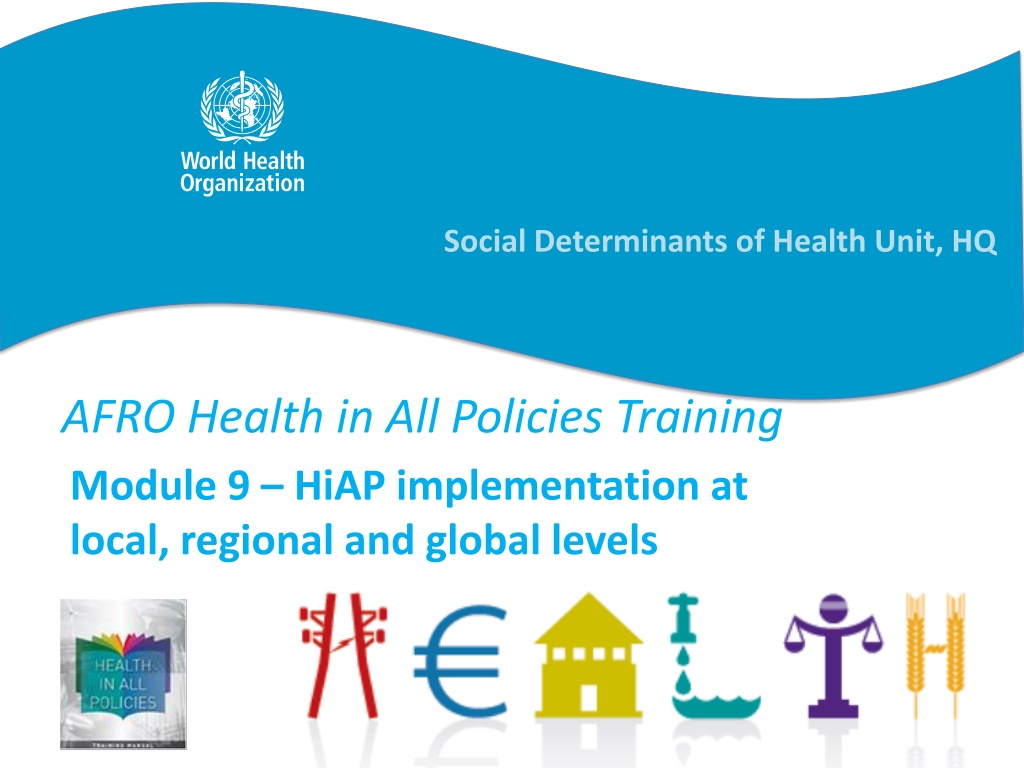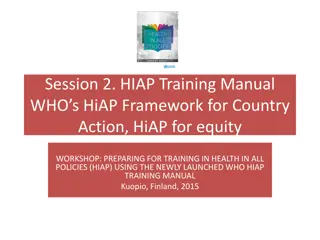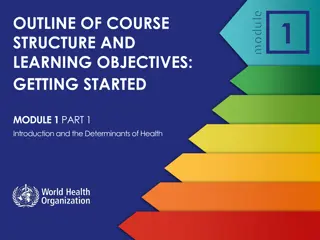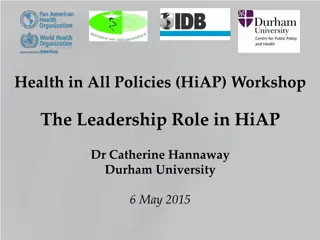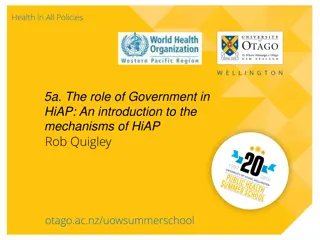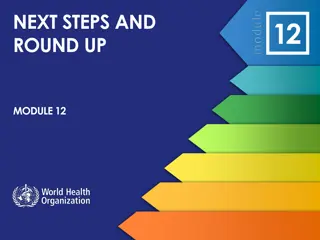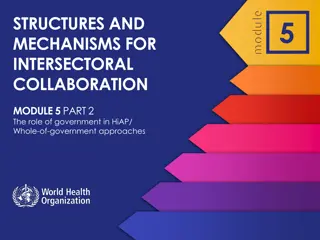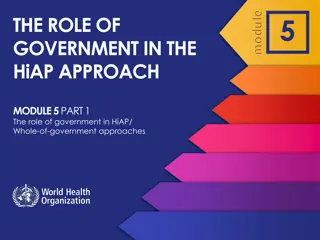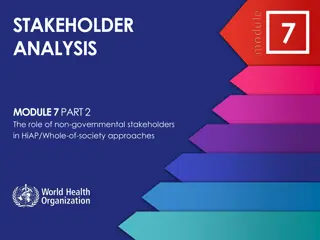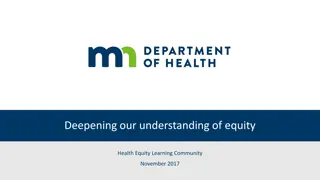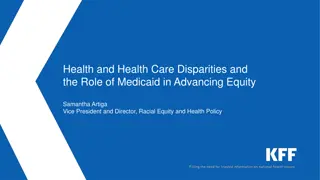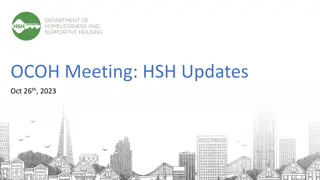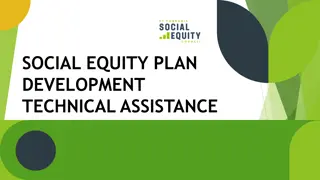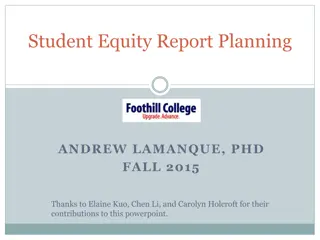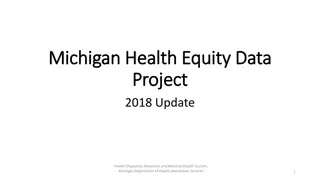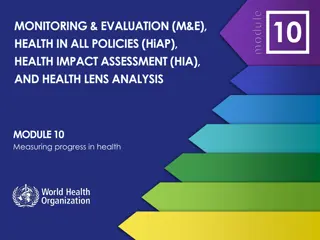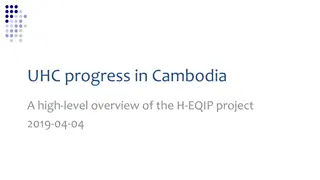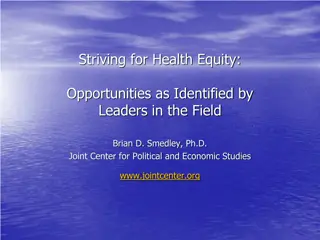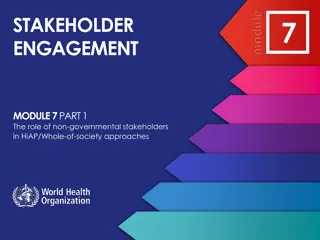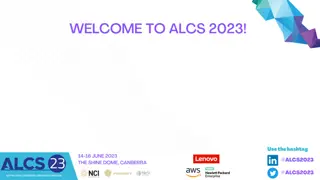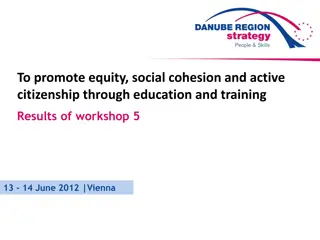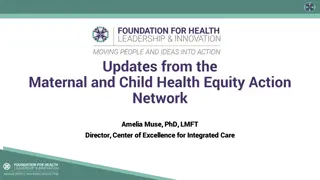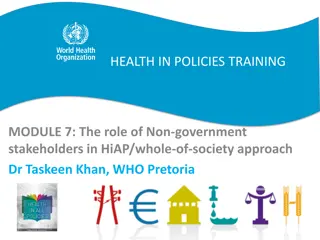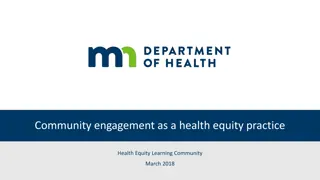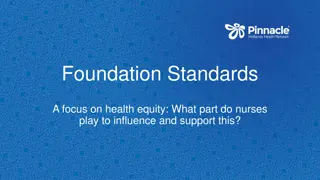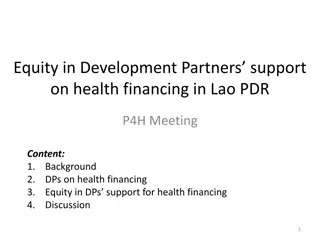Exploring HiAP Implementation for Health Equity
This content explores the implementation of Health in All Policies (HiAP) at local, regional, and global levels, discussing challenges, examples, key results, and conceptual frameworks towards achieving health equity. Various studies and training sessions conducted by WHO and PAHO in collaboration with regional partners are highlighted, emphasizing the importance of Intersectoral Action (ISA) in public health approaches.
Download Presentation

Please find below an Image/Link to download the presentation.
The content on the website is provided AS IS for your information and personal use only. It may not be sold, licensed, or shared on other websites without obtaining consent from the author. Download presentation by click this link. If you encounter any issues during the download, it is possible that the publisher has removed the file from their server.
E N D
Presentation Transcript
Social Determinants of Health Unit, HQ AFRO Health in All Policies Training Module 9 HiAP implementation at local, regional and global levels
Learning objectives of the session 1. Discuss examples of HiAP implementation at the local, regional and/or global level 2. Identify some of the challenges of the implementation AFRO Health in All Policies Training Johannesburg, December 2015
Agenda 1. Key results of HiAP research conducted globally by WHO, specially AFRO & PAHO components 2. What type of ISA is required to reduce health inequities? 3. Political dimensions of ISA 4. Latin America and AFRO's key results 5. Lessons AFRO Health in All Policies Training Johannesburg, December 2015
Acknowledgements/credits Nicole Davison Munodawafa and Peter Phori (AFRO study) Valentine and all SDH Regional Focal Points of the WHO Dr Orielle Solar, FLACSO (PAHO Study) Rockefeller Foundation AFRO Health in All Policies Training Johannesburg, December 2015
Studies were performed by WHO in preparation of the 8th Global Conference on Health Promotion Helsinki 2013: Tcentral theme HiAP. AFRO Health in All Policies Training Johannesburg, December 2015
General Starting Points The degree of intensity of ISA needs to be aligned with the purpose of the persued public policy and its overarching societal context" There is not just a single Intersectoral Action (ISA) type of work, but different degrees or intensities of ISA The above correspond to the dominant public health approach in the respective health and other related sectors . There is synergy between social participation and ISA, especially to moving forward in achieving health equity The way ISA is organized, managed, and resourced influences its intensity and its outcomes . AFRO Health in All Policies Training Johannesburg, December 2015
HiAP action according to dominants health approaches Curative health and health service access focus Health SDH to reducing health inequities focus Promotion, Life Styles and Risk factors focus AFRO Health in All Policies Training Johannesburg, December 2015
The range of relationships between health and other sectors Source: Demonstrating a health in all policies analytic framework for learning from experiences, WHO 2013 AFRO Health in All Policies Training Johannesburg, December 2015
Interelationship between models or types of ISA and their negotiation approaches Negotiation approaches of sectors and actors Models or types of ISA/HiAP There is not an "ideal" and "unique" model it all depends on the objetive/mandate or focus of the work. Could evolve over time. Comprehensive public policies (open to more collaboration) are usually more transformational ones vis a vis societal changes. The same public policy could be different according to the administration level. A "coordination" policy at national level can present more "integration" fashion at the local level . Underlying public policy mandate could explain the above. AFRO Health in All Policies Training Johannesburg, December 2015
Political and technical basis of HiAP: Systematic efforts to modify public policies logic, especially the social ones. Implies POWER shifts. From discrete, circunscribed focus to a proactive one based on citizenship and rights to improve quality of life Aiming at transforrming public & social services through social and political action Technical efforts to modify government structures for making them more flexible Optimizing government structures and capacities Searching for innovative solutions to overcome sectoral (silos) structures Allowing sharing of different sectors experineces, practices, resouces. Political Technical AFRO Health in All Policies Training Johannesburg, December 2015
Conceptual Framework of ISA/HiAP for achieving health equity
Do all HiAP/ISA reduce health inequities? No, only policies systematically aiming and acting upon SDH underlying health equity outcomes are to be effective in reducing health inequities. Therefore our focus should not be any ISA irrespective of originating it within our outside the health sector. Aim and design of policy intervention, based on SDH and equity analysis is, therefore, essential The more structural the SDH are to be policy targeted, the stronger the health equity impact. The converse is also valid. Entry points, policy objective to be clearly defined Equity lens/approach to be always used AFRO Health in All Policies Training Johannesburg, December 2015
Inequality reproduces itself because the political system reflects different access of the influences upon public decisions and because the system responds differently to groups with less resources and less influencing capacity" "Democratization of power is an indispensable condition for human development" "Achieving human development equality implies power redistribution as well as an improved quality of political representation Source: Programa de las Naciones Unidas para el Desarrollo Informe Regional sobre Desarrollo Humano para Am rica Latina y el Caribe 2010: Actuar sobre el futuro: romper la transmisi n intergeneracional de la desigualdad .
Diagram of Analytic Framework of intersectoral action for Health Equity : The main domains Key Drivers of Sustainability
Some lessons from the Americas HiAP experiences 1. ISA practice is quite heterogeneous regarding the role of MoH, the dominant health approach and the degree of intersectorality 2. Two ISA visions are seen vis a vis its comprehensiveness: Coordination of services, expanding access to them from different sector/providers Addressing actual SDH underlying health inequities as a matter of human rights (pol tical, social, economic and cultural) and with social transformation/redistribution
Some lessons from the Americas HiAP experiences 3. Dos spaces of HiAP action coexist in the region: 3.1.2.An emerging and transformational one which starts from a Rights approach, social justice and equity and further develops universality and non discrimination. 3.2.- Local Government social development initiatives, many of them circunscribed and limited on servide provision and healthy life styles. 3.1.1.The traditional one which although respecting the Rights approach , focusses on poverty and social vulnerability. 3.1.- Linked to Social Security Policies and Programmes with two visions: Source: Solar & Bernales 2014
However it is not just a matter of coordinating services to reach the people Or to provide services outside traditional health spaces what really makes the difference Source: Solar & Bernales 2014
Facilitating factors FOR STARTING HIAP FOR SUSTAINING IT POWER: Political will of Central Government Political will of local government including the will of transfering resources for a decentralized implementation. A degree of autonomy in the formulation & implementation of local startegies. KNOWLEDGE: Experience, information, research capacity and linkages with academic centers. Government support networks. Support from International Organizations Political will at different levels Institutional capacity (combination of financial resources in the short term and prioperly trained staffing resources in the long run) Establishment of coordination structures. Communication and sensitization of local teams. Social Participation & interest in the community to sustain the strategy Generating networks of technical support AFRO Health in All Policies Training Johannesburg, December 2015 Source: Solar & Bernales 2014
ISA/HiAP is a COMPLEX intervention Multiple components (interventions ) Several levels of intervention High need of coordination between several systems Heterogeneity in needs and mechanisms Complex ways / complex contexts Meaning AFRO Health in All Policies Training Johannesburg, December 2015
Some lessons from the SS African HiAP experiences
Key highlights from literature review: Few large scale HiAP documented for addressing explicitly & systematically SDH/HI 1 However important experiences in programmes: 2 HIV/AIDS (Rights approach, social participation) 3 Helminthic control (agriculture, water sources & urban development) 4 Mental health and Nutrition 5 Poverty reduction/SWAPS (microcredits& health) 6 AFRO Health in All Policies Training Johannesburg, December 2015
Key highlights from literature review: Social Participation seen as key success factor, including role of NGOs, FBOs with Govts.; BUT HiAP complexity requires sustained capacities ISA facilitated by coordination mechanisms: tobacco, road safety, environment AFRO Health in All Policies Training Johannesburg, December 2015
Key recommendations Governance to be enhanced by MoH inc. creation of SDH/HiAP units and ISA coordination mechanims Use National Dev. Plans/PRSPs to include SDH/HiAP Use Ouagadougou's PHC & existing frameworks HiAP& SDH training in other sectors: a must Use HIA and develop SDH&HiAP M&E tools to measure progress Enable CSO participation WHO/AFRO needs to start mainstreaming its own programmes on SDH/HI and provide TC to countries AFRO Health in All Policies Training Johannesburg, December 2015
Thank you for your attention! Q&A? villare@who.int AFRO Health in All Policies Training Johannesburg, December 2015
